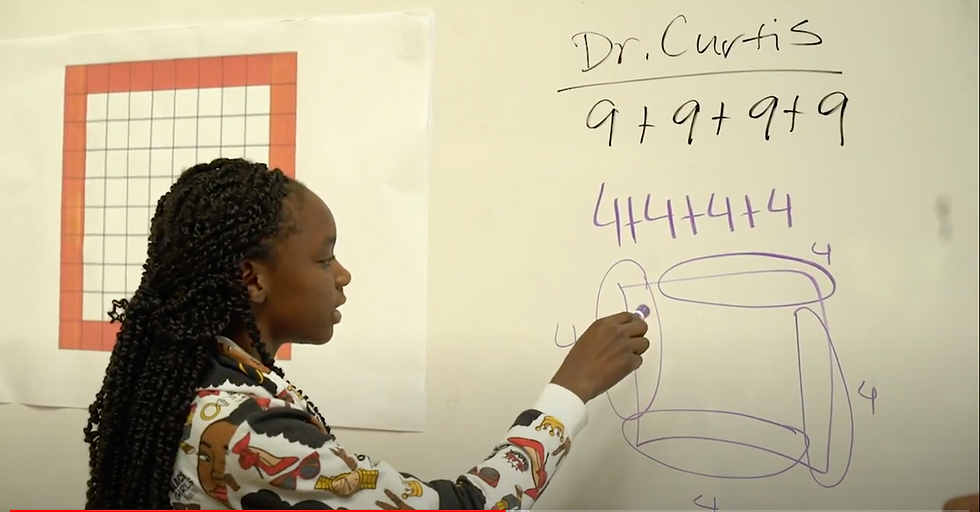Don't Stop, Bo-lieve it!
- Yay Math!
- Sep 20, 2018
- 3 min read
Updated: Oct 7, 2018
Interested in creating a vibrant learning community of engaged mathematicians? Want all of your students to know they are a math person? Us too!
Welcome to the Mathematical Agency Improvement Community (MAIC) blog. Throughout the year we will use this forum to share ideas, resources, and stories about how to support our students as they build their mathematical identities.
The journey (see what we did there?) to a student centered classroom can be challenging. For some of us it feels uncomfortable to teach in ways that don’t reflect our own experience, while for others it is an exciting challenge but it’s unclear where to start. The goal of MAIC is to build a community of explorers and go on this journey together. If you have resources or stories to share please let us know! We are always on the lookout for ways to support our students in developing a deep conceptual understanding of mathematics and the confidence to use the tools of mathematics to explore the world around them.
Yay Math!
What Does Student Centered Mean?
Three big ideas guide how we define student centered.
Everyone is a math person. We developed the tools of mathematics to explore the world around us. We notice patterns, ask questions, seek to understand underlying structures, critique different ideas, and design models to represent our thinking. We recognize that ALL students have mathematical ideas to contribute, and it is our job to recognize and celebrate these ideas.
Mathematics is a collaborative discipline. When our classes are set up so that students can use and develop their innate mathematical abilities – noticing patterns, engaging in discussion about mathematical ideas, creating models to represent their thinking, inventing problem solving strategies, and critiquing each other's thinking – they build their mathematical identity.
When students can bring their full mathematical selves into the classroom and have their ideas heard, discussed, debated, and valued, they develop mathematical agency. When students believe that their ideas have value for the community they feel a sense of belonging. When they have opportunities to reflect on their learning and see mistakes as valuable they develop a growth mindset, and when they feel intellectually engaged they feel that math is relevant to their identity.
While many teachers are intrigued by the idea of student centered instruction, not many of us have actually experienced a math class that embodies these ideas. How do we do this? Where can we start?
One starting point is to use a lesson structure that promotes student discussion. We broadly call this a 'launch, explore, discuss' lesson structure. There are many variations of this type of instructional routine, but the basic idea is that students bear the cognitive load of problem solving and their ideas are used as the basis for small group and whole class discussion. The following videos from two of our MAIC teachers and their students provide a glimpse into what this type of instruction looks and sounds like. Curious to learn more? Visit the Student Centered Instruction tab on our website: http://www.mathagency.org
Elementary Perspective
Third grade MAIC teacher Karen Underwood reflects on her journey using the "Launch, Explore, Discuss" framework with her students.
Middle School Perspective
Former eighth grade MAIC teacher Katerina Milvidskaia and her former student, Sarah discuss the rationale for a launch, explore, discuss lesson structure and unpack the student experience.
Resources
What Does the Journey Look Like?
Jordan Templeton, a current middle school teacher, and former GSE resident shares a powerful piece of her own journey and lays the tracks along the way for others to join her.

MAIC-ing it Happen!
Our community of learners have jumped right in as we kicked off four lesson studies across our HTH villages! A HUGE thanks to all the teachers, directors, and facilitators for MAIC-ing this happen!

Challenge of Week
Where do you fall on Jo Boaler's Mindset Progression? Where would you like to be? Is there one area in particular that you want to focus on?
Matome
Matome is the Japanese term for "collecting and organizing, summing up, or reviewing" Many Japanese math classes end with Matome - where students reflect on what they learned, sometimes even naming the lesson according to their new growing understanding of a particular math concept.
We would love to know what you think. After perusing the ideas, stories, and resources on this blog what are your take-aways? What would your Matome be?
Given that only 15% of the population feels that they are 'a math person', for us, this quote from Toni Morrison felt compelling as we begin our journey to liberate our students.




Comments